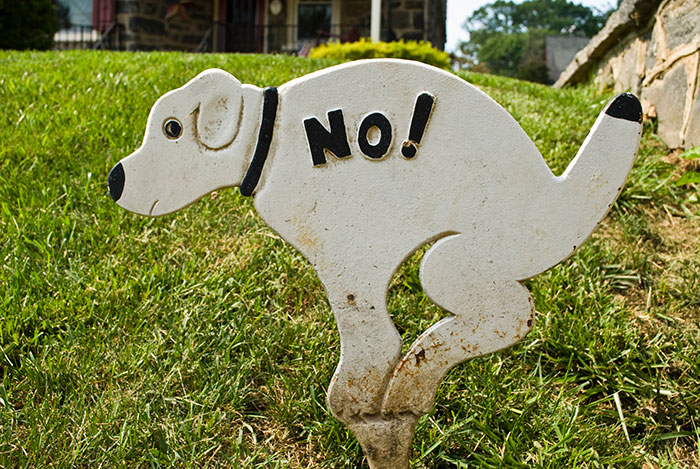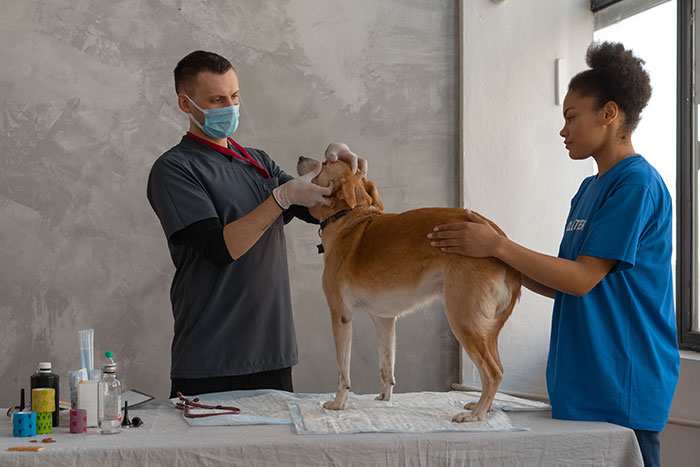HighlightsBlood in dog stool can indicate various health issues.Abrupt diet changes can disrupt intestinal microflora.Parvovirus can cause lethal bloody diarrhea in dogs.
It can be very alarming if you notice blood in your dog’s poop. Sometimes it can be fresh and bright mixed with the stool while looking very dark on other occasions. If your dog is experiencing abnormal stool where blood is involved, read on to educate yourself regarding when to call your vet or when to take your dog to the nearest emergency vet immediately.
The information provided herein is for informational purposes only. Please refer to ourdisclaimerfor more details..
Table of ContentsCommon Causes of Blood in Dog PoopAbrupt diet changeMelenaHematocheziaParvovirusHemorrhagic GastroenteritisIntestinal blockageWhen to Call Your Vet
Common Causes of Blood in Dog Poop

Image credit:mslavick, CC BY 2.0 DEED
From puppyhood through maturity, if you ever spot blood in your dog’s stool, do not hesitate to contact your veterinarian. You will be able to describe what you are witnessing and in return, they will be able to help you narrow down the potential causes and the level of severity you’re dealing with. Blood in dog poop is going to depend on the underlying cause.
Abrupt diet change
Melena
Appearing almost black with a tarry texture, melena is a disease stemming from the digestive tract that is rooted in the small intestine, esophagus, or stomach. This means that the blood has already been swallowed or digested. Hookworms can cause bleeding in the upper digestive tract, resulting in dark blood. Liver cancer, tumors, clotting disorders, and ulcers from harsh medications can also play a major role when there is dark-colored blood in stool.
Hematochezia
Bright red blood, or “frank” blood, typically stems from the lower digestive tract, large intestine, or rectum. Parasites can also cause this type of blood in their stool, but viral and bacterial infections will be the main culprits for your veterinarian to follow up on. Inflammation of the colon, abrupt diet change, or the ingestion of foreign material can be possible causes of bloody stool.
Parvovirus
Hemorrhagic Gastroenteritis
Commonly known as “HGE”, this disorder causes bloody diarrhea in dogs. Most common in small breed dogs, the true cause of HGE remains unknown. Some common factors have proven to be, but are not limited to: foreign body ingestion, blood clotting disorders, intestinal parasites, bacteria, trauma, gastrointestinal ulcers, and infectious diseases. In a clinical setting, HGE will require a handful of diagnostic tests to get to the root of the cause so the appropriate treatment can commence. Typically hospitalization is encouraged for those who are diagnosed.
Intestinal blockage
When to Call Your Vet

Image credit:Mikhail Nilov
While we are now aware of common causes of bloody dog poop, always consult a vet as soon as possible to address any additional option that might be causing any type of blood to appear in your pet’s stool. A healthy, normal bowel movement should consist of formed stool with no blood or mucus observed. Ensure that you are seeing a veterinary professional annually, at least. To be on the safe side, make sure your trip to the vet includes a thorough physical exam, a fecal analysis, and blood work to make sure that all major organs are functioning as they should.
As always, if you have any concerns about your pet’s health, do not hesitate to make an appointment with your preferred veterinarian.
Pet Wellness